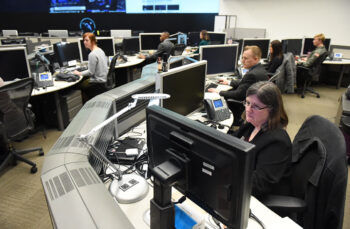
Frank Calvelli, assistant secretary of the Air Force for space acquisitions and integration. (US Space Force photo by Tiana Williams)
WASHINGTON — With his sights for the “next several years” set on speeding new capabilities to the field and ensuring ongoing programs come to fruition, the Air Force’s space acquisition czar Frank Calvelli has provided his workforce with a primer on building their oversight and management skills.
“To go along with the 9 Space Acquisition Tenets, and the Simple Formula to Go Fast in Space Acquisition, this final memo, titled Essential Program Management Skills for Government Space Acquisition Professionals, is the third piece of the puzzle, and outlines 10 essential program management skills and best practices that are important for government acquisition professionals working space programs to learn over their career,” Calvelli told Breaking Defense in an email today.
Calvelli, whose official title is assistant secretary of the Air Force for space acquisition and integration, signed the memo to his workforce on Dec. 18. Provided to Breaking Defense today, the 10 things it tells acquisition personnel they “need to learn” are:
- Master the Fundamentals of Acquisition
- Develop Expertise in Satellite Development and/or Ground Software Development
- Relentlessly Manage Your Program Baseline
- Utilize Critical Thinking and Effective Communication Skills
- Understand How Industry Operates and What Motivates Them
- Team with Mission Operations
- Share, Collaborate, and Help Each Other
- Know Your Mission Area and Drive the Future
- Become Proficient with the Budget Cycle and Working with Congress
- Ensure Your Program Integrates End to End and Works as a System
While perhaps partly an exercise in distilling common sense for management staff, the memo does touch on a number of areas where the Defense Department broadly has long struggled in overseeing acquisition programs — in part due to the fact that program managers often rotate in and out within a few years time.
For example, Calvelli said the memo’s number two exhortation on developing an understanding of how satellites and ground systems are built and work is “critical” for improving management.
The memo explains: “Having a deep technical understanding of what it takes to acquire and develop a satellite or ground system allows you to proactively solve technical issues, review contractor design material, challenge technical assumptions, effectively evaluate technical proposals, make better decisions, reduce technical risks, and drive the acquisition to deliver on cost and schedule.”
As long ago as 2009, the Government Accountability Office (GAO) took DoD to task for allowing contractors too much power in integrating and managing space systems development program. The congressional watchdog agency since that time has consistently expressed concerns that the size and technical skill level of the space acquisition workforce is not sufficient to handle the growing portfolio and increased complexity (particularly regarding software) of programs.
Likewise, number eight highlights the fact that cultivating a deep technical understanding of their mission areas will allow program managers to “to identify mission gaps and shortfalls, drive research and development, and define future acquisitions to provide additional capabilities needed for the mission.”
Calvelli also highlighted the memo’s fifth entry urging program managers to get to know how the private sector works, noting in his email that it is “really important for the government to understand how industry operates and what motivates them. Also in 5, it’s critical for the government to track what industry is doing, so as not to replicate and pay for work that already exists at another company.”
Finally, Calvelli foot-stomped the need for program management discipline — with the memo urging program managers to be on top of what is happening in the development cycles 24/7 to get in front of problems that could cause delays.
“My other favorite is 3 – Relentlessly manage your program,” he said in his email. “Government needs to actively manage effort on a daily basis and keep their focus on delivering on cost and schedule. We need to break the paradigm of thinking schedule slips are OK.”
Marines eye 2025 fielding of 3 new, mobile air defense systems
“We are on track from a programmatic standpoint — cost, schedule performance — but we’re always gonna be late to need,” said Col. Andrew Konicki, the program manager for Ground Based Air Defense (GBAD). “The threat is ever changing and ever evolving.”


























